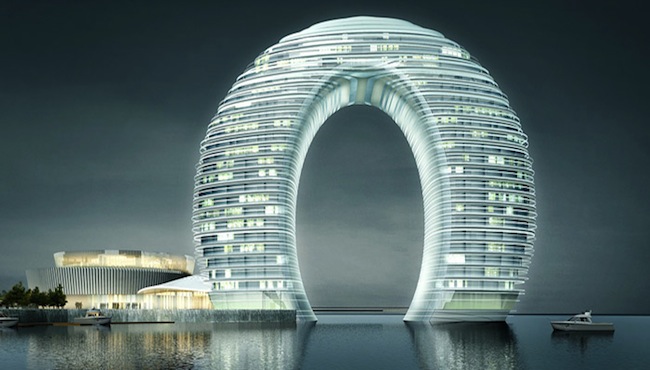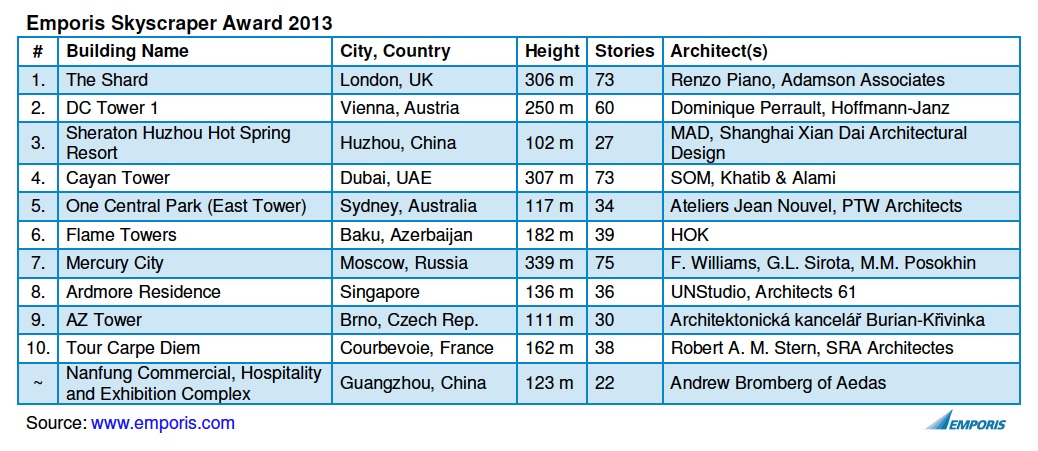The Emporis Skyscraper Award, the world's most renowned prize for skyscrapers, this year goes to London.
The tallest building in Western Europe, The Shard, was chosen by an international panel of experts from more than 300 skyscrapers of at least 100 meters' height and which were completed during the previous calendar year.
The award, given by Emporis, the international provider of building data, is now into its 14th year.
The 306-meter-tall winning building, designed by the architect Renzo Piano, won over the jury thanks to its unique glass fragment-shaped form and its sophisticated architectural implementation.
"Construction of The Shard was complicated by the particularly tight site and therefore needed innovative planning. This makes the result all the more impressive: a skyscraper that is recognized immediately and which is already considered London's new emblem," stated the expert jury in explaining its decision.
Second place in the voting went to DC Tower 1 by Dominique Perrault Architecture. The 250-meter-tall Viennese skyscraper particularly stands out for the contrasting way in which its facade is treated: Three mirror-smooth sides are broken by a craggy, jagged fourth that gives the building a strength of expression and sense of solidity, despite its slim stature.
DC Tower 1 also impressed due to its comprehensive sustainability concept, including photovoltaics to generate energy, local plants with low water requirements in the green areas of the building, and electric car chargers to save on CO² emissions.
The third-placed project also breaks with the standards of conventional high-rise architecture and thus adds to the great variety of forms and shapes that characterizes this year's Emporis Skyscraper Award. Located on Lake Tai, the Sheraton Huzhou Hot Spring Resort, conceived by last year's winning architects MAD, is a 102-meter-tall hotel whose shape evokes a gigantic ring. Its daring design is further accentuated by its illumination at night, which creates imposing reflections of the building in the lake.
After the award had gone in the last two years to Absolute World Towers in Canada and New York by Gehry at Eight Spruce Street in the U.S., no North American skyscraper is to be found in the Top Ten on this occasion. By contrast, the Emporis Skyscraper Award winners' list contains a total of five European projects – the last time so many were represented was six years ago. With The Shard, this is the fifth time the coveted architecture prize has gone to Europe.
About Emporis
Emporis is a leading database of information about building and construction projects, based in Germany. For over a decade Emporis has helped companies, organizations and individuals stay informed about the building industry. The Emporis Skyscraper Award is the world’s most renowned prize for high-rise architecture.
About the Award
The Emporis Skyscraper Award has been given since 2000. The jury is formed of architecture experts from all over the world, who judge nominated buildings according to aesthetic and functional design criteria. Previous winners include Absolute World Towers (2012), New York by Gehry at 8 Spruce Street (New York City, 2011) and Hotel Porta Fira (L’Hospitalet de Llobregat, 2010).
Related Stories
| Aug 11, 2010
Great Solutions: Healthcare
11. Operating Room-Integrated MRI will Help Neurosurgeons Get it Right the First Time A major limitation of traditional brain cancer surgery is the lack of scanning capability in the operating room. Neurosurgeons do their best to visually identify and remove the cancerous tissue, but only an MRI scan will confirm if the operation was a complete success or not.
| Aug 11, 2010
Great Solutions: Collaboration
9. HOK Takes Videoconferencing to A New Level with its Advanced Collaboration Rooms To help foster collaboration among its 2,212 employees while cutting travel time, expenses, and carbon emissions traveling between its 24 office locations, HOK is fitting out its major offices with prototype videoconferencing rooms that are like no other in the U.
| Aug 11, 2010
2009 Judging Panel
A Matthew H. Johnson, PE Associate Principal Simpson Gumpertz & HegerWaltham, Mass. B K. Nam Shiu, SE, PEVP Walker Restoration Consultants Elgin, Ill. C David P. Callan, PE, CEM, LEED APSVPEnvironmental Systems DesignChicago D Ken Osmun, PA, DBIA, LEED AP Group President, ConstructionWight & Company Darien, Ill.
| Aug 11, 2010
Inspiring Offices: Office Design That Drives Creativity
Office design has always been linked to productivity—how many workers can be reasonably squeezed into a given space—but why isn’t it more frequently linked to creativity? “In general, I don’t think enough people link the design of space to business outcome,” says Janice Linster, partner with the Minneapolis design firm Studio Hive.
| Aug 11, 2010
BIM school, green school: California's newest high-performance school
Nestled deep in the Napa Valley, the city of American Canyon is one of a number of new communities in Northern California that have experienced tremendous growth in the last five years. Located 42 miles northeast of San Francisco, American Canyon had a population of just over 9,000 in 2000; by 2008, that figure stood at 15,276, with 28% of the population under age 18.








